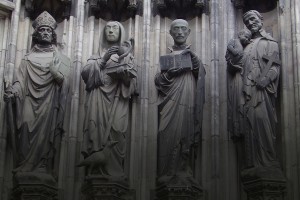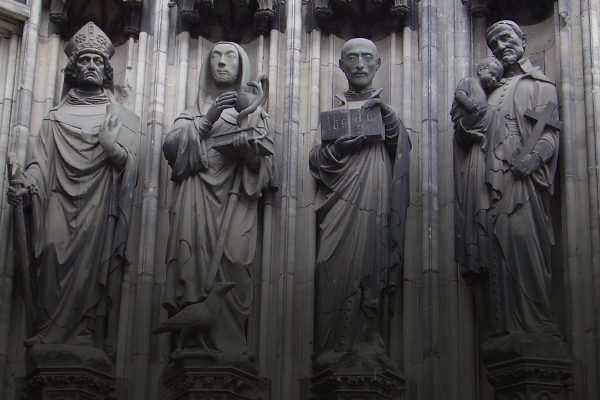
The Book of the Resurrection of Christ by Bartholomew the Apostle (200-550AD)
This text has been reconstructed from three Coptic fragments and additional pieces of papyri (the Coptic language was spoken in Egypt until the 7th century). The dating for the book has been very difficult to establish. The British Museum possesses the best manuscript of The Book of the Resurrection of Christ by Bartholomew the Apostle, but this manuscript dates to the 12th century. There are fragments of the text that are much older, but scholars are undecided on the original date of authorship. Some place it as late as the 5th or 6th century given its similarities to other Coptic literature. Some scholars believe that this book is, in fact, the lost Gospel of Bartholomew, although it is unclear what relationship this text or the Questions of Bartholomew might have to the missing Gospel.
Why Isn’t It Considered Reliable?
While the text claims to have been authored by the Apostle Bartholomew, the date of authorship (even considering the earliest possible dating by scholars), is far too late to have been penned by anyone who was an eyewitness to the life of Jesus. If this text is, in fact, the lost Gospel of Bartholomew (as some scholars have maintained), there is a record of it amongst the writings of the Church Fathers. Jerome (early 5th century) mentions the Gospel of Bartholomew in the prologue of his Commentary on Matthew and labels it as an unreliable apocryphal work. In addition, Pope Gelasius (late 5th century) includes the Gospel of Bartholomew in his list of apocryphal Gospels.
How Does It Corroborate the Life of Jesus?
The Book of the Resurrection of Christ by Bartholomew the Apostle acknowledges a number of details related to the life and ministry of Jesus. Jesus is described as “all-powerful” and identified as the “First Born of the Father”, “the Saviour”, the “Son of God”, the “Holy Lamb” and the “Shepherd” who came from Heaven. Judas Iscariot is identified as the man who betrayed Jesus, and the crucifixion and the death of Jesus are acknowledged, along with the piercing of His side. The resurrection of Christ is also described, along with several details of the narrative paralleling the Biblical account. Jesus’ body is recovered by Joseph of Arimathea, laid in a new tomb, wrapped in linen and anointed with oils and perfumes. An earthquake is describe and the tomb is visited by the women who followed Him during His ministry (including his mother Mary, Salome, Mary Magdalene, Mary and Martha). Jesus appeared to this group and His disciples after the resurrection and He ascended to Heaven, sitting at the right hand of the Father. Jesus’ disciples are acknowledged and named: Bartholomew (of course), Peter, Andrew, James, John, Philip, Thomas, Matthew, James son of Alphaeus, Simon Zelotes, Thaddeus, and Matthias.
Where (and Why) Does It Differ from the Reliable Accounts?
The text focuses on the Passion of Jesus (events surrounding His death and resurrection) and the Eucharist. Bartholomew is given a place of prominence in the text (something very common for apocryphal texts in which an apostle is cited as the author in order to provide a sense of authority). Like some of the Infancy Gospels, The Book of the Resurrection of Christ by Bartholomew the Apostle appears to have been written in order to fill in details related to the Passion narrative. In addition to this, the book may also have been written to give authority to a Eucharist liturgy used by a local Egyptian sect of believers. The text describes Bartholomew as being lifted into heaven to observe the heavenly liturgy celebrating the resurrection as if to legitimize and provide authority for earthly Eucharist celebrations.
The Questions of Bartholomew (200-550AD)
Like The Book of the Resurrection of Christ by Bartholomew the Apostle, this text may actually be the lost Gospel of Bartholomew according to some scholars. There are also similar challenges in dating this text, as scholars recognize that the Questions of Bartholomew contains passages suggesting it was written well after other apocryphal documents (the unashamed veneration of Mary is one such example). Some have suggested it was penned as late as the 6th century while others date it as early as the 2nd century. The Gospel exists in three different languages (Greek, Latin and Slavonic) and these individual versions vary from one another. Scholars have attempted to reconstruct the original text by layering the existing manuscripts. There is speculation the original text was written in Coptic in Egypt, like The Book of the Resurrection of Christ by Bartholomew the Apostle.
Why Isn’t It Considered Reliable?
Like The Book of the Resurrection of Christ by Bartholomew the Apostle, this text claims to have been authored by the Apostle Bartholomew. But once again, the date of authorship (even considering the earliest possible dating by scholars) is far too late to have been penned by the real Bartholomew. Similarly, if this text is the lost Gospel of Bartholomew, it was also rejected by the Fathers of the Church on grounds that it was a heretical fraud. The Questions of Bartholomew is similar to Gnostic dialogue Gospels in which a key disciple of Jesus is provided with secret wisdom that is intended for a select few. In this respect, it is yet another Gnostic, heretical document identified by early Church leaders.
How Does It Corroborate the Life of Jesus?
The Questions of Bartholomew does acknowledge several aspects of the reliable Gospel accounts. Jesus is identified as “Lord” and is the source of spiritual wisdom. The text acknowledges Jesus was crucified on a cross and was resurrected. In addition, the darkness that occurred at the death of Jesus is mentioned. Jesus’ disciples are acknowledged, including Bartholomew, Peter, Andrew and John. The virgin conception of Jesus is acknowledged (although the text supports the notion Mary was a perpetual virgin)
Where (and Why) Does It Differ from the Reliable Accounts?
The text is clearly Gnostic and portrays Jesus as coming to earth from the Father to provide men with the secret wisdom required to “heal every sin”. In addition, the text demonstrates a Gnostic view of the material body. Jesus tells His disciples He cannot tell them the secret mysteries of heaven until He puts off “the body of the flesh”. The text is filled with secrets related to Jesus’ descent into Hell prior to the resurrection, the immaculate conception of Mary and secrets provided by Satan himself related to his creation and his fall. Throughout all of this, Jesus instructs Bartholomew this information is not to be shared with those who are unworthy, reflecting a Gnostic value for esoteric knowledge.
Many skeptics point to the very existence of any ancient alternative stories of Jesus in an effort to cast doubt on the reliability of the canonical accounts. But these late fictional narratives, when assessed under the template we typically use to determine eyewitness reliability, cannot withstand the scrutiny. They are authored too late, contain uncorroborated claims, and were penned by authors motivated to use the name of Jesus for their own purposes. The texts attributed to Bartholomew were not actually written by the Apostle, and there are good reasons to exclude them from the reliable record. The four canonical Gospels (Mark, Matthew, Luke and John) are still the earliest reliable record of Jesus, written within the lifetimes of the eyewitnesses who knew Jesus personally.

J. Warner Wallace is a Dateline featured Cold-Case Detective, Senior Fellow at the Colson Center for Christian Worldview, Adj. Professor of Christian Apologetics at Talbot School of Theology, Biola University, author of Cold-Case Christianity, God’s Crime Scene, and Forensic Faith, and creator of the Case Makers Academy for kids.
Subscribe to J. Warner’s Daily Email
J. Warner Wallace is a Dateline featured cold-case homicide detective, popular national speaker and best-selling author. He continues to consult on cold-case investigations while serving as a Senior Fellow at the Colson Center for Christian Worldview. He is also an Adj. Professor of Christian Apologetics at Talbot School of Theology, Biola University, and a faculty member at Summit Ministries. He holds a BA in Design (from CSULB), an MA in Architecture (from UCLA), and an MA in Theological Studies (from Gateway Seminary).

































Pingback: Non – Canonical & heretical written sources – 1c15
Pingback: The Book of the Resurrection of Christ by Bartholomew the Apostle – 1c15
Pingback: The Questions of Bartholomew – 1c15